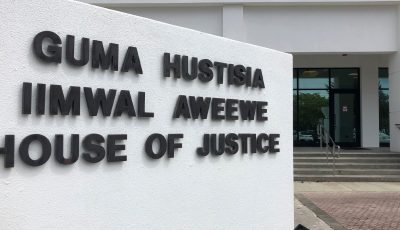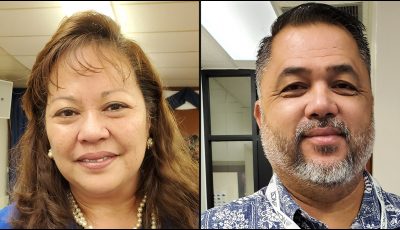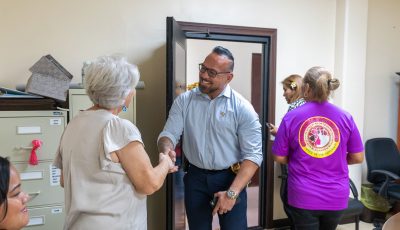Naraja: Many letters plead for Calvo’s lenient sentence
Judge says defendant’s behavior unfathomable; to this date
Superior Court Presiding Judge Robert C. Naraja has disclosed that he has received many letters from supporters of convicted child molester Patrick M. Calvo in which they pleaded for a lenient sentence.
“It is evident from these letters that Calvo is viewed by some as an upstanding member of society,” said Naraja in his written sentencing order last Wednesday. He did not name Calvo’s supporters.
Calvo, 54, used to be president of the Rotary Club of Saipan.
Naraja said these letters also provide a basis that Calvo may be rehabilitated, based upon the presence of community support, stemming in part from his prior civic contributions.
Naraja said he considers both these factors as evidence for mitigation.
At the resentencing hearing last Wednesday, the judge imposed a seven-year prison term on Calvo. The original sentence that Naraja handed down in May 2010 was eight years imprisonment.
Naraja resentenced Calvo to eight years in prison for sexual assault in the second degree, eight years in prison for sexual abuse of a minor in the second degree, five years in prison for sexual abuse of a minor in the third degree, and six months in prison for disturbing the peace.
Naraja merged the sentences into a single sentence. Naraja said to the extent that one offense is not a lesser-included offense of the other, those sentences are to run concurrently with the sentence of sexual assault in the second degree, of eight years.
In total, the judge said, Calvo is sentenced to a term of eight years, all suspended except for seven years.
Without a revocation of his probation, Calvo shall serve seven years in prison, with credit of three days of time already served.
Calvo’s jail term is considered commenced as of May 25, 2010.
Accordingly, the judge said, the defendant shall be released from the Department of Corrections no later than May 25, 2017.
After completing the prison term, Calvo will be placed on probation for seven years.
On restitution, Naraja ordered Calvo to pay for the victim’s treatment for the remainder of his sentence, including during the pendency of his probation.
He ordered the government to submit before April 28, 2017, a restitution request, including past billings for the victim’s medical and psychological treatment that took place on or before March 28, 2017.
Naraja said Calvo may file a motion to modify his probation period or probation conditions, but any such motion must initially be submitted under seal and accompanied by a medical specialist’s report that explains the most current results of Calvo’s sex offender assessment and progress on sex offender treatment, which may include behavioral modification therapy.
Naraja required Calvo to, among other things, seek a clinical psychiatric evaluation treatment, register as a sex offender, perform 1,500 hours of community work service, and submit to HIV testing.
Calvo may receive continued assessment and treatment from Dr. Irshaad Shaffeeullah, a psychiatrist at the Commonwealth Healthcare Corp., while he is in its custody and upon his release from DOC.
Calvo is restricted from jobs involving direct contact with minors or those under the age of 18 years old.
Unless with the supervision of a third-party, he is prohibited from initiating contact or approaching minors.
At the resentencing, Naraja acknowledged that Calvo has become involved in different programs during his time at DOC.
This involvement, the judge noted, includes providing education assistance to other inmates and has helped develop and implement training project for other inmates.
Naraja said it is clear from the letters provided as part of Calvo’s presentence investigation report that he has made a conscious effort to become a productive member of society during the course of his incarceration.
Naraja said Calvo has taken this opportunity to better himself and the lives of his fellow inmates.
Naraja said Calvo has also testified before the court as to his contributions to DOC and his fellow inmates by writing grants for federal funding projects.
The judge, however, also noted that Calvo has not, to this date, expressed remorse for the possibility of inflicting lifelong pain and trauma on the victim.
In fact, Naraja said, additional evidence submitted by Calvo does not reassure this court that he will ever be remorseful, unless Calvo goes through sustained counseling and behavioral management therapy.
Accordingly, Naraja said, he does not take into account Calvo’s remorsefulness as a mitigating factor.
With respect to aggravating factors in this case, Naraja said that Calvo was convicted of sexually assaulting a minor, who was only 13 years old at the time.
Naraja said the adverse psychological and emotional effects of this assault will most likely be with the victim for the rest of her life.
Naraja said the victim suffered nightmares, trouble sleeping, and a loss of appetite.
“Calvo’s behavior is unfathomable and the court views this blatant violation of trust as a serious stain on Calvo’s character,” the judge said.
Naraja said the criminal justice system alone is not capable of healing the wounds wrought from this very deepest betrayal of trust—by any measure of punishment.
Naraja concluded that these factors require him to seriously question whether Calvo can be successfully rehabilitated and allowed back into society, without some guarantee and the glimmer of hope of adequate behavioral modification therapy.
After considering the mitigating and aggravating factors, the judge said he ultimately determines that the proper sentence for Calvo is eight years imprisonment, one year suspended, with credit for time already served.
Naraja said he suspended Calvo’s sentence for one year, to allow for officers of the Office of Adult Probation to continuously monitor Calvo’s rehabilitation into society for an extensive period of time; in an effort to reduce or eliminate the possibility of recidivism.
At the oral pronouncement of Calvo’s sentence, Naraja called for “intensive monitoring”—and encouraged Calvo to submit to continued sexual offender assessments and to explore any available treatment options, such as sustained behavioral modification therapy.
This provision, Naraja said, would effectively keep Calvo within the criminal justice system and will grant the victim the aegis of certain probation conditions, such as no contact order for an extended period of time—that would not have existed, had he been released from incarceration after serving the full eight-year sentence.
Naraja said after completing the prison term, Calvo will be placed on probation for seven years.
In 2000, the Office of the Attorney General filed two criminal cases against Calvo for allegedly sexually abusing two minor girls in 1997 and 1998.
In one jury, the jury acquitted him. In 2005, the court dismissed the second case after the government moved to drop the charges.
In September 2009, a Superior Court jury found Calvo guilty of sexually assaulting and abusing a then-13-year-old girl in 2008.
On May 27, 2010, Naraja sentenced Calvo to eight years in prison. Calvo appealed, asking the CNMI Supreme Court to reverse his conviction and set a new trial.
In July 2014, the high court upheld Calvo’s conviction. The justices, however, ordered the Superior Court to redo the sentencing because it imposed probation, restitution, and community service without suspending some of Calvo’s jail term.



























